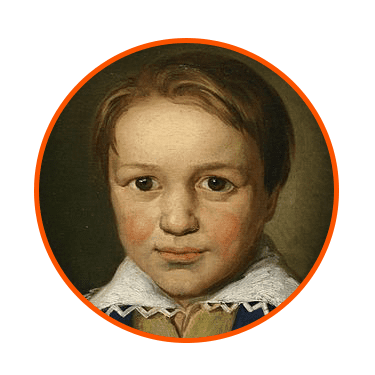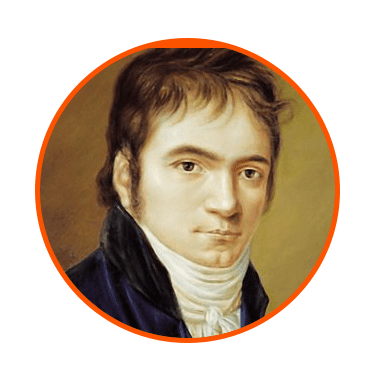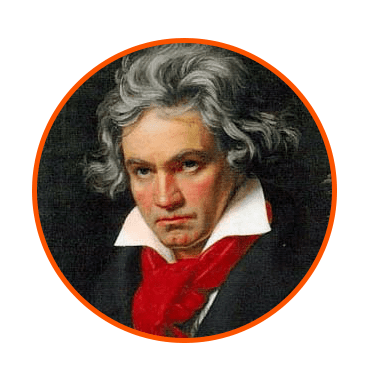Emily Ruth Allen, Ph.D. Candidate in Musicology (Florida State University)
Ludwig van Beethoven (1770-1827) is one of the most well-known figures from the Western classical tradition. He is considered a leading figure in the transition from classical styles (think Wolfgang Amadeus Mozart) to romantic ones.
Beethoven’s style, of course, was ever-changing, so his career is divided into three phases:
Early (~1792-1802)

A portrait of the 13-year-old Beethoven by an unknown Bonn master (c. 1783)
Middle (~1802-1815)

Beethoven in 1803,
painted by Christian Horneman
Late (~1815-1827)

1820
Joseph Karl Stieler
From life
"IMITATION" PERIOD
In his early phase Beethoven was rooted in the classical style, so this is called his “imitation” period. For example, one can see this in his Symphony No. 1. Beethoven decided to leave his hometown, Bonn, in 1792 to pursue a musical career in Vienna, where he studied with classical composers like Franz Joseph Haydn (aka father of the string quartet and symphony). Beethoven spent much time giving piano performances here to cultivate financial support from local nobility.
"HEROIC" PERIOD
Starting in 1802 Beethoven became more experimental in his output. He also began experiencing hearing loss, which led to depression, antisocialism, and irritability (understandably so) for fear of others’ opinions and losing his career. Despite this, Beethoven was determined to write music; this is part of the reason that 1802-1815 is called his “heroic” period. The “heroicism” of this phase also stems from his interest in pre-tyrannical Napoleon Bonaparte, who was the original inspiration behind Beethoven’s Symphony No. 3. During this time Beethoven’s music began to get longer, rougher, and more aggressive (e.g., his Violin Concerto and Symphony No. 7) than the more classically-infused output of the previous era. He became bolder and more heroic as a composer
During his last period (1815-1827) Beethoven was almost completely deaf.
He began to adapt to this loss, depending more on writing out his compositions in sketchbooks (still heavily studied by historians today to understand his process) and communicating with friends and family through conversation books (i.e., people wrote down what they wanted to say to him). The revolutionary, heroic attitude and style of the previous era was gone, as Beethoven seemed more comfortable in his own skin musically. His compositions were more radical in terms of their structure and used a greater variety of techniques.
Since his death in 1827, Beethoven has become an icon of the Romantic period.
He has been pegged as a stereotypical “struggling” artist (i.e., creating art to cope with hardship) that influenced many other Romantic composers. He has also been used to represent an ideal genius, a concept that was established in the nineteenth century. However, historians now strive to go beyond these narratives that put Beethoven on a god-like pedestal. For example, Robin Wallace’s Hearing Beethoven: A Story of Musical Loss and Discovery (2018) describes the challenges of going deaf and how Beethoven dealt with it in writing music, conducting orchestras, etc. Beethoven can be seen as more than a face of the Western classical music canon—he was human and faced challenges to which we can relate.
Beethoven has also influenced popular culture in many ways as well.
For instance, if you go to Beethoven’s IMDb page, one can see how often his music is used in film and television. You can also see examples of where his compositions have been used in other music at whosampled.com. For more on Beethoven’s representation in United States culture, check out Michael Broyles’ Beethoven in America (2011). As can be seen in these resources, you’ve probably heard Beethoven’s music your whole life. Do you recognize any of the films, shows, or other media in which Beethoven’s works have been used? What meanings does his music take on in these contexts? Consider how you engage with his music in media and live concert experiences—you’ll be surprised at what you’ll learn about his compositions.

